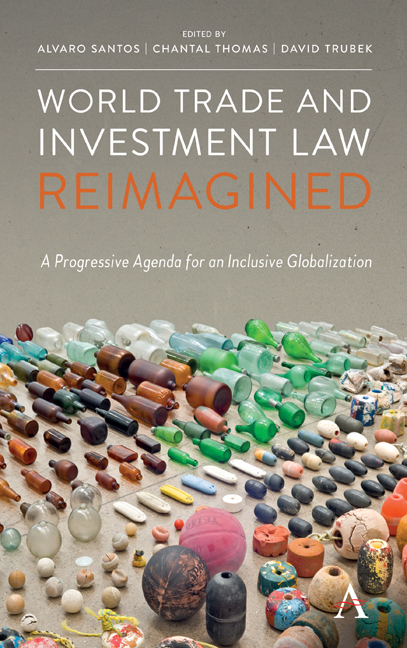Book contents
- Frontmatter
- Contents
- Acknowledgments
- List of Contributors
- Introduction World Trade and Investment Law in a Time of Crisis: Distribution, Development and Social Protection
- PART I RETHINKING THE POLITICAL ECONOMY OF TRADE: COMMENTS ON DANI RODRIK'S STRAIGHT TALK ON TRADE
- PART II SETTING THE STAGE FOR A PROGRESSIVE VISION: EMERGING ISSUES IN WORLD TRADE AND INVESTMENT LAW
- SECTION 1 MAPPING THE NEW CONTEXT FOR TRADE AND INVESTMENT LAW
- SECTION 2 DEALING WITH MAJOR CHANGES IN THE WORLD ECONOMY
- SECTION 3 FRAMING A MORE EQUITABLE INVESTMENT LAW REGIME
- SECTION 4 SUPPORTING DEVELOPMENT
- SECTION 5 REINFORCING SOCIAL PROTECTION: SPREADING THE BENEFITS OF TRADE, DEALING WITH LOSSES AND EXPLORING THE TRADE–IMMIGRATION NEXUS
- Chapter Nineteen Trade Agreements in the Twenty-First Century: Rethinking the Trade–Labor Linkage
- Chapter Twenty The New Frontier for Labor in Trade Agreements
- Chapter Twenty-One Re-embedding Liberalism: Introducing Passporting Fees for Free Trade
- Chapter Twenty-Two Restoring Trade's Social Contract in the United States
- Chapter Twenty-Three Migration and International Economic Asymmetry
- Index
Chapter Twenty-One - Re-embedding Liberalism: Introducing Passporting Fees for Free Trade
from SECTION 5 - REINFORCING SOCIAL PROTECTION: SPREADING THE BENEFITS OF TRADE, DEALING WITH LOSSES AND EXPLORING THE TRADE–IMMIGRATION NEXUS
Published online by Cambridge University Press: 07 September 2019
- Frontmatter
- Contents
- Acknowledgments
- List of Contributors
- Introduction World Trade and Investment Law in a Time of Crisis: Distribution, Development and Social Protection
- PART I RETHINKING THE POLITICAL ECONOMY OF TRADE: COMMENTS ON DANI RODRIK'S STRAIGHT TALK ON TRADE
- PART II SETTING THE STAGE FOR A PROGRESSIVE VISION: EMERGING ISSUES IN WORLD TRADE AND INVESTMENT LAW
- SECTION 1 MAPPING THE NEW CONTEXT FOR TRADE AND INVESTMENT LAW
- SECTION 2 DEALING WITH MAJOR CHANGES IN THE WORLD ECONOMY
- SECTION 3 FRAMING A MORE EQUITABLE INVESTMENT LAW REGIME
- SECTION 4 SUPPORTING DEVELOPMENT
- SECTION 5 REINFORCING SOCIAL PROTECTION: SPREADING THE BENEFITS OF TRADE, DEALING WITH LOSSES AND EXPLORING THE TRADE–IMMIGRATION NEXUS
- Chapter Nineteen Trade Agreements in the Twenty-First Century: Rethinking the Trade–Labor Linkage
- Chapter Twenty The New Frontier for Labor in Trade Agreements
- Chapter Twenty-One Re-embedding Liberalism: Introducing Passporting Fees for Free Trade
- Chapter Twenty-Two Restoring Trade's Social Contract in the United States
- Chapter Twenty-Three Migration and International Economic Asymmetry
- Index
Summary
Trade liberalization has proceeded on the assumption that eventual aggregate welfare gains will exceed the losses. While compensatory mechanisms exist in most countries, they tend to be underfunded and ineffective. To begin to address this problem, the direct beneficiaries from trade liberalization need to pay more than they do now. This essay proposes to introduce passporting fees to generate more public revenue. Transnational business actors would be required to obtain a free trade passport to receive the excludable benefits that a free trade agreement provides. This would change the political economy of trade radically and allow for the creation and expansion of compensatory mechanisms necessary to re-embed economic liberalism in systems of social protection.
In his seminal article on “embedded liberalism,” John Ruggie argued that to maximize the combination of free trade and social welfare, nation-states must have the power to buffer their populations from trade shocks. The compensatory mechanisms— whether directly targeted at trade-related effects (“trade adjustment measures” such as transfer payments or retraining efforts directly linked to trade-related dislocations) or in the form of general economic and social policies (such as unemployment insurance) —are funded through nation-state– based systems of tariffs and taxation. Post– World War II trade liberalization through the now almost universal General Agreement on Tariffs and Trade (GATT), which continues to be the bedrock of the World Trade Organization (WTO), has successfully brought down tariff levels significantly. In the past two decades, an everincreasing number of bilateral, regional and, most recently, megaregional free trade agreements (FTAs) has further expanded the freedom under which businesses operate transnationally. However, despite their extended scope and supposedly comprehensive nature, not even the most recent trade agreements address public revenue generation, instead maintaining the traditional separation of trade and tax. This has contributed to an unsustainable “disembedded liberalism” in which transnational business actors enjoy the gains that trade agreements create while successfully avoiding state-based systems of taxation. The lack of funding is one reason the architects of the contemporary global economic order have failed to develop compensatory mechanisms commensurate with increased trade liberalization.
- Type
- Chapter
- Information
- World Trade and Investment Law ReimaginedA Progressive Agenda for an Inclusive Globalization, pp. 225 - 232Publisher: Anthem PressPrint publication year: 2019

